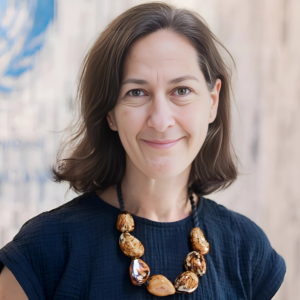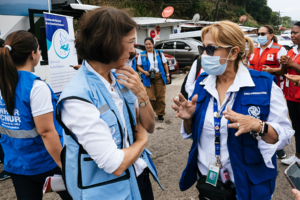OCHA Regional Lead for Latin America Discusses Coordinating with Compassion

Shelley Cheatham, Head of the Regional Office for Latin America and the Caribbean at the UN Office for the Coordination of Humanitarian Affairs, has spent nearly two decades in humanitarian assistance. Whether responding to drought in Ethiopia, conflict in Lebanon or hurricanes in the Caribbean, she says what guides her is the belief that all people deserve dignity. “Anybody who goes through a personal trauma or a personal loss—a disaster or a conflict or an economic crisis—would want to go through that with dignity,” Cheatham says.
Her commitment to human dignity is in good company at OCHA. It’s also a perspective needed now more than ever as questions about the value of humanitarian assistance are making it harder for organizations like OCHA to carry out their mission.
Raised in Compassion
Raised in Eugene, Oregon, Cheatham was shaped by the influence of family and community. “I grew up in a relatively small town, with my grandma and the church that we went to talking a lot about the need to give to community and emphasizing that the blessings that we have are blessings to be shared,” she recalls.
Those “blessings shared” often took the form of her grandmother’s volunteerism, which was “instilled in us—me and my sisters—from a very young age.” At the same time, her father’s work as an international journalist was a source of early inspiration. “I would always wonder, why is he going to Colombia? Why is he going to Israel?” A sense of America’s role in and responsibility to a larger world took shape early in Cheatham.

That spark for service led her first to the classroom, where she taught high school history, and then back to her own studies in Washington, DC, to explore conflict and humanitarian assistance.
Stints at the World Bank, USAID and American Red Cross deepened Cheatham’s perspective on how the U.S., in particular, contributes to global humanitarian efforts. It also lit a passion for this U.S. citizen to pack her bags and join fellow humanitarians for a life of service beyond American borders.
The Changing Landscape of Humanitarian Assistance
Since Cheatham joined OCHA in 2008, she has served in many of the world’s most volatile crises—earthquakes in Turkey, Peru and Ecuador, storms in Mexico, conflict in Sudan and Myanmar, and now as the Regional Head of Office for Latin America and the Caribbean. The experience of twenty years in the field has also given her keen perspective on how humanitarian assistance has changed—in some ways for the better, in other ways, it’s never faced more challenges.
“If I look back, I would have been struck by the bravery and courage of getting out and delivering an item like food, a tarp or a tent,” she says. “But we’ve evolved as a humanitarian system.”
What stands out now is the focus on dialogue and understanding individual needs. “It’s not just handing over something; it’s talking to people and understanding what they need to be more resilient; to maintain their dignity.” The courage of humanitarians, of course, endures. “I’ve seen people negotiate at checkpoints, putting their lives at risk to help get assistance to people. We still do that, but I think we’re doing it differently, and that’s what is really striking these days.”
“I’ve seen people negotiate at checkpoints, putting their lives at risk to help get assistance to people—we still do that, but I think we’re doing it differently, and that’s what is really striking these days.”

And yet, the humanitarian sector is facing unprecedented challenges. “We’re seeing more narratives and attacks about aid being fraudulent, aid assisting invaders, aid assisting criminals, and that is limiting our ability to talk with governments and support them in assisting their own citizens,” she said.
Funding shortages are also having real consequences. “Clinics are closing. People in Central America who had access to healthcare in certain communities, those clinics don’t exist anymore. Pregnant women going in for prenatal checks? Those clinics aren’t there.” She fears a return to a less effective humanitarian model. “My great fear is that we’ll go back 20 years to when it’s just: arrive, give, leave, and we’re not considering dignity or that trust relationship.”
As an American, Cheatham underscores the direct benefit to the U.S. for maintaining a robust humanitarian assistance portfolio. “It really isn’t an enormous amount of money, and yet it has this effect of goodwill,” she said. “Communities look to the United States as an area of friendship and that has helped us politically, it’s helped us economically.”
“Communities look to the United States as an area of friendship and that has helped us politically, it’s helped us economically.”
She sees the aid efforts in Latin America and the Caribbean as essential to regional stability. “This is the neighborhood. It’s the backyard of the United States, and you know you want your neighbors to be safe. You want your neighbors to be healthy. You want your neighbors to be okay.”
“This is the neighborhood. It’s the backyard of the United States, and you know you want your neighbors to be safe. You want your neighbors to be healthy. You want your neighbors to be okay.”
Cheatham points to larger forces at play for that sense of waning interest in support for the neighborhood, “I think we’re losing that global sense of humanity… I think we suffer as human beings when we lose compassion and empathy.”
When reflecting on how she remains so committed in the face of these persistent challenges, she struck a more personal tone, “I have two boys, so wanting to contribute to a world where they grow up safe and healthy and compassionate motivates me personally.”
As the humanitarian sector grapples with mounting pressures, voices like Cheatham’s serve as a crucial reminder of the purpose behind their work and the value of American investment: for all children to grow up safe and healthy and compassionate. With dignity.